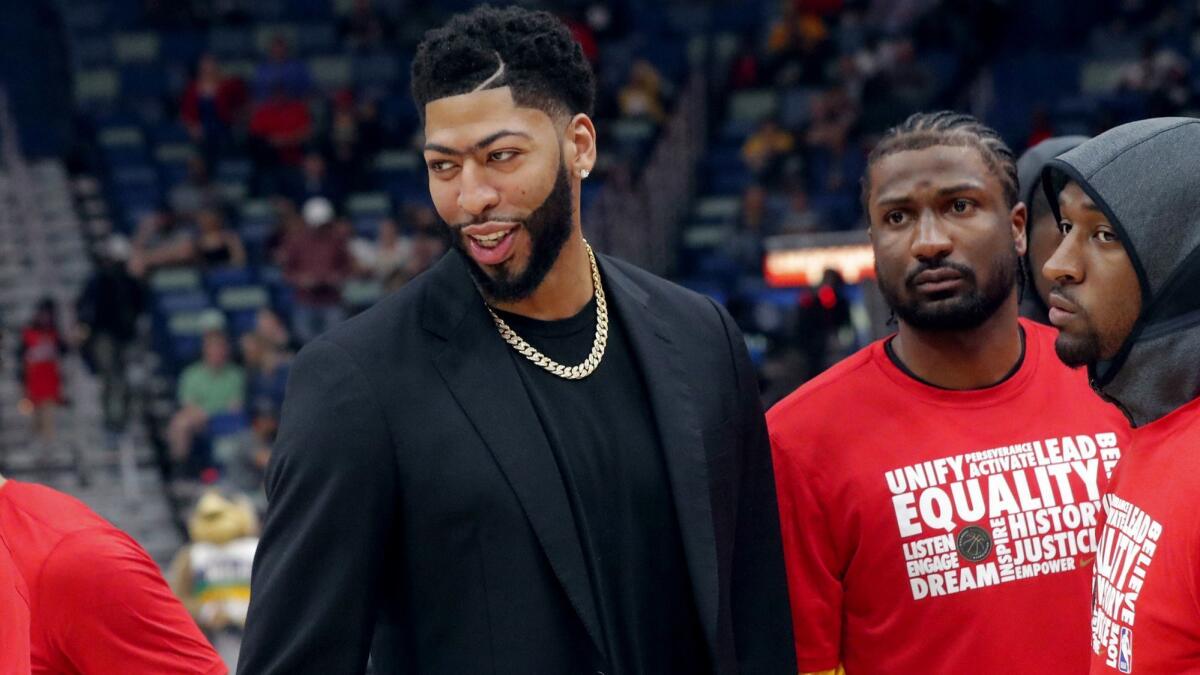Column: Lakers fans shouldn’t freak out that the Anthony Davis trade hit a roadblock

- Share via
So the word Tuesday was the Lakers were out of the Anthony Davis sweepstakes.
Of course they were.
With so much at stake for both the Lakers and New Orleans Pelicans, there was no chance negotiations would be painless. An impasse of this sort had to be expected.
The situation can change. The Lakers still can acquire Davis by the trade deadline Thursday at noon Pacific time.
This is what happens in trade talks. Teams posture. They make “outrageous” demands, as the Pelicans did, according to a person who spoke to Times reporter Brad Turner. Sometimes they back down from these demands and compromise. Sometimes they don’t.
The Lakers’ attempts to close the deal will be a test of not only the capabilities of Magic Johnson and Rob Pelinka, but also the extent of LeBron James’ influence. Save for his on-court performance, this ability of James to force change could be the most important factor in shaping the team’s future, the difference between him winning a championship with the Lakers and tainting his legacy with four seasons of failures.
The genesis of the potential trade can be traced to September, when Davis signed with Rich Paul of Klutch Sports, who also represents James.
Sign up for our Lakersnewsletter »
Paul moved the idea into the realm of possibility last week, first by telling the Pelicans that Davis wouldn’t sign a contract extension with them, then by informing them of the teams with which he would consider doing so. By declaring Davis would be open to long-term deals with only the Lakers, Clippers, New York Knicks and Milwaukee Bucks, the agent essentially reduced the number of potential trade partners to four. Any team that doesn’t have a good chance of retaining Davis beyond next season almost certainly won’t offer as much for him. And, really, what the list did was narrow the market to one, as the Lakers have considerably more assets to trade than the other three teams.
How Paul — and, by extension and presumption, James — has tried to force this trade won’t sit well with everyone, especially the Pelicans. They were bound to push back by demanding an unreasonable bounty.
What makes this particular situation interesting is that is involves two desperate franchises — the Lakers, a one-man team with relatively short-term title aspirations that would be delusional if that one man was anyone other than James, and the Pelicans, who have nothing to attract an audience outside of Davis.
The Lakers have to contend with the calendar, as James is 34 and won’t be dominant forever. Their sense of urgency was reflected in their last offer, which included practically their entire team outside of James: Lonzo Ball, Kyle Kuzma, Brandon Ingram, Josh Hart, Ivica Zubac, Kentavious Caldwell-Pope and two first-round draft picks. They also offered to provide the Pelicans salary-cap relief by taking Solomon Hill and his contract, which has one year at $12.7 million left on it.
The Pelicans countered by demanding four first-round picks and two second-round selections in addition to the players mentioned. The Lakers said no, aware that accepting the request would have emboldened the Pelicans to ask for draft picks far enough into the future that they could be used to select James’ middle-school-age son.
The Pelicans had to ask. Again, they have nothing else. They have the option of holding on to Davis for the rest of the season and seeing if they can do better on the expanded summer market. Then the Boston Celtics, who aren’t eligible to trade for Davis this season because of the NBA’s peculiar roster rules, figure to emerge as an enticing trade partner.
Only the Celtics could be more enticing to the Pelicans than to Davis, and what Davis thinks matters. This is the NBA. For a number of reasons, the players have more leverage than in any other professional sports league. There are risks involved with delaying the inevitable, as the Lakers might not be in position to offer as many players are they are now.
By delaying the inevitable, the Pelicans would be counting on Davis experiencing a change of heart that expands their options. They could be comfortable taking on such risks. Or they could decide against continuing this game of chicken with their star player, in which case Davis will be wearing purple and gold by the end of this week.
Twitter: @dylanohernandez
More to Read
Go beyond the scoreboard
Get the latest on L.A.'s teams in the daily Sports Report newsletter.
You may occasionally receive promotional content from the Los Angeles Times.











